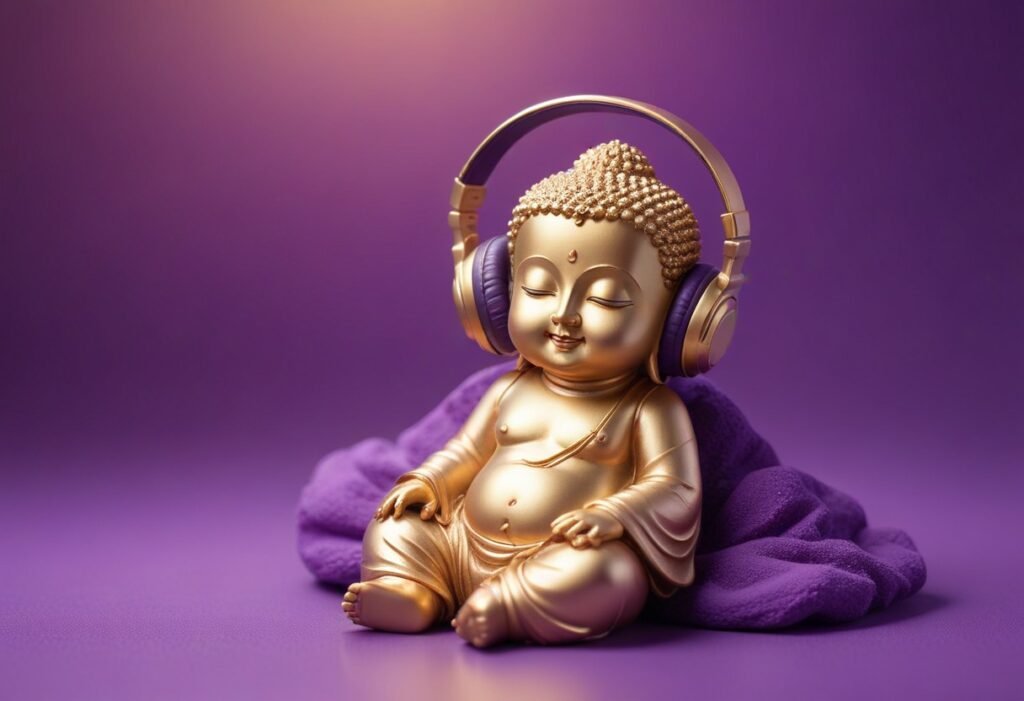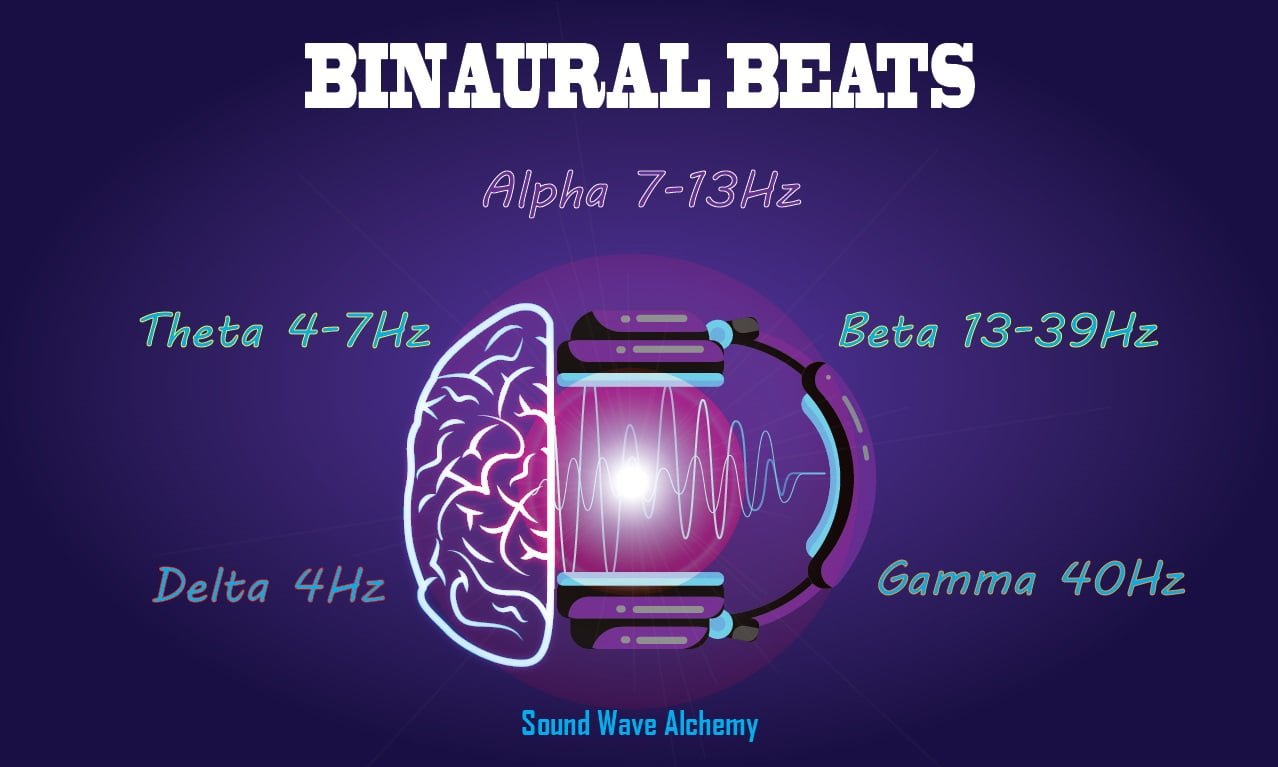Are you struggling with getting a good night’s sleep? Do you have trouble falling asleep or staying asleep? If so, you’re not alone. Many people suffer from sleep disorders such as insomnia, which can have a negative impact on their overall health and well-being. Fortunately, there are natural remedies that can help you get the restful sleep you need, like Solfeggio Frequencies, Hypnosis, Guided Meditation and many more. One of the most effective is binaural beats.
Binaural beats are a form of sound therapy in which two different frequencies are played in each ear to generate one final frequency in the brain. This third frequency is believed to help synchronize brainwaves and promote relaxation, making it an effective tool for promoting deep, restful sleep. But with so many different binaural beats tracks and frequencies available, it can be hard to know where to start. That’s why we’ve put together this guide to the best binaural beats for sleep and insomnia relief.
In this article, we’ll cover the most effective Hz ranges for promoting sleep, how to use binaural beats for sleep, and our top recommendations for the best binaural beats tracks for promoting deep, restful sleep. Whether you’re dealing with occasional sleeplessness or chronic insomnia, binaural beats can be an effective, drug-free way to get the restful sleep you need to feel your best.
So let’s dive in and explore the world of binaural beats for sleep and insomnia relief.

Brainwave-tuned audio for deep meditation, alignment, and inner calm.
A perfect tool for high-vibe self-healing.
$249.49 $24.00

Pure pulsing tones to re-center your focus and balance your energy field.
Royalty-free for use in personal or healing work.
$149.99 $36.69
- Understanding Binaural Beats
- The Best Binaural Beats for Sleep
- How to Use Binaural Beats for Sleep
- Frequently Asked Questions
- What are the potential dangers associated with listening to binaural beats?
- How can binaural beats improve sleep quality?
- What are the benefits of using binaural beats for insomnia relief?
- Are there specific binaural beat frequencies recommended for deep sleep induction?
- Can binaural beats help reduce anxiety to promote better sleep?
- How should one listen to binaural beats to maximize their effectiveness for sleep?
- What duration of binaural beats listening is optimal for achieving restful sleep?
Understanding Binaural Beats
Binaural beats are a form of auditory stimulation that can affect brainwave activity. They are created by playing two different tones, one in each ear, which the brain perceives as a single tone with a frequency equal to the difference between the two tones. This phenomenon is known as the “frequency-following response” and can be used to influence brainwave patterns.
Binaural Beats Science

Binaural beats have been studied extensively in the field of neuroscience, with research showing that they can have a measurable effect on brainwave activity. Studies have shown that binaural beats can increase the production of delta waves, which are associated with deep sleep and relaxation. They can also decrease the production of beta waves, which are associated with wakefulness and alertness. Another study done specially to examine the direct effect of Binaural Beats in inducing sleep : In summary, the study found that combining a 6 Hz binaural beat with ASMR triggers, particularly at a 30:60 dB ratio, induced greater theta power and emotional stability compared to ASMR triggers alone, suggesting this combined stimulus could be an effective method for improving sleep quality.
Zen Essentials for Binaural Beats
-

-
 Sunrise Alarm Clock & Sound Machine
Sunrise Alarm Clock & Sound Machine
Gentle wake-up, screen-free routines, white noise, smart light.
From $169.99 -
 Sony WH-1000XM6 – Meditation & Travel Headphones
Sony WH-1000XM6 – Meditation & Travel Headphones
Top-tier noise canceling, clarity & comfort. Great for deep focus, meditation, or travel.
$448.00
Delta Binaural Beats Benefits
Delta binaural beats, in particular, have been found to be effective in promoting deep, restful sleep and overcoming insomnia. This is because delta waves are connected with the deepest phases of sleep, which are crucial for physical and mental rejuvenation. By increasing the production of delta waves, delta binaural beats can help to induce a state of deep relaxation and promote restful sleep.
In addition to promoting sleep, delta binaural beats have also been found to have other potential benefits. Research has suggested that they can help to reduce anxiety and stress, improve mood, and enhance cognitive function. However, more research is needed to fully understand the potential benefits of delta binaural beats.
Overall, binaural beats are a promising tool for promoting deep, restful sleep and overcoming insomnia. By understanding the science behind binaural beats and the benefits of delta waves, we can use this tool to improve our sleep and overall well-being.
The Best Binaural Beats for Sleep

As we all know, getting a good night’s sleep is essential for our physical and mental health. However, many individuals struggle with insomnia, making it difficult to fall asleep and stay asleep. Fortunately, binaural beats can help promote deep, restful sleep and overcome insomnia. In the following section, we’ll go through the criteria for the top-notch binaural beats for sleep, as well as the best options for insomnia relief.
Criteria for the Best Binaural Beats
When it comes to choosing the best binaural beats for sleep, there are a few key factors to consider. First, the frequency range should be within the delta and theta waves, which are associated with deep relaxation and sleep. Delta waves range from 0.5 to 4 Hz, while theta waves range from 4 to 8 Hz.
Second, the binaural beats should be of high quality and provide a consistent and clear sound. This ensures that the beats are effective in promoting relaxation and sleep.
Third, the binaural beats should be accompanied by soothing music or sounds that further promote relaxation and sleep.

Brainwave-tuned audio for deep meditation, alignment, and inner calm.
A perfect tool for high-vibe self-healing.
$249.49 $24.00

Pure pulsing tones to re-center your focus and balance your energy field.
Royalty-free for use in personal or healing work.
$149.99 $36.69
Top Picks for Sleep and Insomnia Relief
- Sleeping Waves Delta Waves: This binaural beats track is specifically designed to promote deep sleep and relaxation. It features delta waves in the range of 0.5 to 4 Hz and is accompanied by calming music and sounds of nature.
- Binaural Beats Sleep: This track features a range of delta and theta waves to promote relaxation and deep sleep. It is accompanied by soothing music and sounds of nature, making it an excellent choice for those who struggle with insomnia.
- Deep Sleep Binaural Beats: This track features delta waves in the range of 0.5 to 4 Hz and is designed to promote deep, restful sleep. It is accompanied by calming music and sounds of nature, making it an effective tool for overcoming insomnia.
In conclusion, binaural beats can be an effective tool for promoting deep, restful sleep and overcoming insomnia. When choosing the best binaural beats for sleep, it is important to consider the frequency range, quality, and accompanying music or sounds. Our top picks for sleep and insomnia relief include Sleeping Waves Delta Waves, Binaural Beats Sleep, and Deep Sleep Binaural Beats.
How to Use Binaural Beats for Sleep

Using binaural beats for sleep can be a simple and effective way to promote deep, restful sleep and overcome insomnia. In this section, we will discuss the optimal listening conditions and the duration and timing for best results.
Optimal Listening Conditions
To get the most out of binaural beats for sleep, it is important to create optimal listening conditions. This includes finding a quiet and comfortable space where you can relax and focus on the beats. You may also want to consider using headphones to ensure that you are getting the full effect of the binaural beats.
⭐️⭐️⭐️⭐️⭐️ (4.7/5)
Create a relaxing bedtime & wake-up ritual with light therapy & white noise.
$169.99
🛏️ Relax & Buy NowDuration and Timing for Best Results
The duration and timing of your binaural beats session can also have an impact on its effectiveness. It is recommended to listen to binaural beats for at least 15-30 minutes before going to bed. This will help to relax your mind and body, making it easier to fall asleep.
It is also important to listen to binaural beats consistently to see the best results. This means incorporating them into your nightly routine and making them a regular part of your sleep hygiene practices.
Overall, binaural beats can be a helpful tool for promoting deep, restful sleep and overcoming insomnia. By creating optimal listening conditions and incorporating them into your nightly routine, you can experience the full benefits of binaural beats for sleep.
🧠 Recommended Gear for Binaural Beats
-
 Beyerdynamic DT 770 Pro (80 Ohm)
Beyerdynamic DT 770 Pro (80 Ohm)
Studio-grade closed-back headphones for pure and immersive frequency response.
From $169.99 -
 The Original White Noise Sound Machine
The Original White Noise Sound Machine
Fan-based, natural white noise for deep meditation and sleep therapy.
From $49.99 -
 Sennheiser HD 620S
Sennheiser HD 620S
Audiophile closed-back headphones for crystal-clear high-resolution sound.
From $327.99
Frequently Asked Questions
What are the potential dangers associated with listening to binaural beats?
While many people use binaural beats for relaxation, meditation, and focus, there are some potential Binaural Beats danger to be aware of:
- Hearing Damage: Listening at high volumes can cause hearing loss or damage.
- Seizures: Those with epilepsy or a history of seizures might be at risk, as binaural beats can potentially trigger seizures.
- Mental Health Effects: In some cases, binaural beats may exacerbate anxiety or other mental health issues.
- Interference with Sleep: Improper use, especially at high volumes or during inappropriate times, might disrupt sleep patterns.
It’s important to use binaural beats responsibly and consult a healthcare provider if you have any underlying health conditions.
How can binaural beats improve sleep quality?
Binaural beats can improve sleep quality by synchronizing brainwaves to a specific frequency range. This synchronization can help induce a state of deep relaxation, which is essential for falling asleep and staying asleep. By listening to binaural beats before bed, the brain can enter a state of calmness and tranquility, which can lead to more restful sleep.
What are the benefits of using binaural beats for insomnia relief?
Binaural beats can be an effective tool for insomnia relief. By promoting relaxation and reducing anxiety, binaural beats can help individuals fall asleep faster and stay asleep longer. Additionally, binaural beats can help regulate circadian rhythms, which can improve overall sleep quality.
Are there specific binaural beat frequencies recommended for deep sleep induction?
Yes, there are specific binaural beat frequencies that are recommended for deep sleep induction. The delta frequency range, which is between 0.5 and 4 Hz, is known for promoting deep sleep. Binaural beats in this frequency range can help the brain enter a state of deep relaxation, which is essential for deep, restful sleep.
Can binaural beats help reduce anxiety to promote better sleep?
Yes, binaural beats therapy can help reduce anxiety to promote better sleep. By promoting relaxation and reducing stress, binaural beats can help calm the mind and body, which can lead to more restful sleep. Additionally, binaural beats can help regulate the production of cortisol, a hormone that is associated with stress and anxiety.
How should one listen to binaural beats to maximize their effectiveness for sleep?
To maximize the effectiveness of binaural beats for sleep, it is recommended to listen to them before bed in a quiet, dark room. It is also important to use high-quality headphones to ensure that the binaural beats are delivered effectively to both ears. Additionally, it is recommended to use binaural beats consistently over a period of time to see the best results.
What duration of binaural beats listening is optimal for achieving restful sleep?
The optimal duration of binaural beats listening for achieving restful sleep varies from person to person. However, it is generally recommended to listen to binaural beats for at least 30 minutes before bed to promote relaxation and induce sleep. It is important to note that the effects of binaural beats can be cumulative, so consistent use over a period of time may lead to better results.









